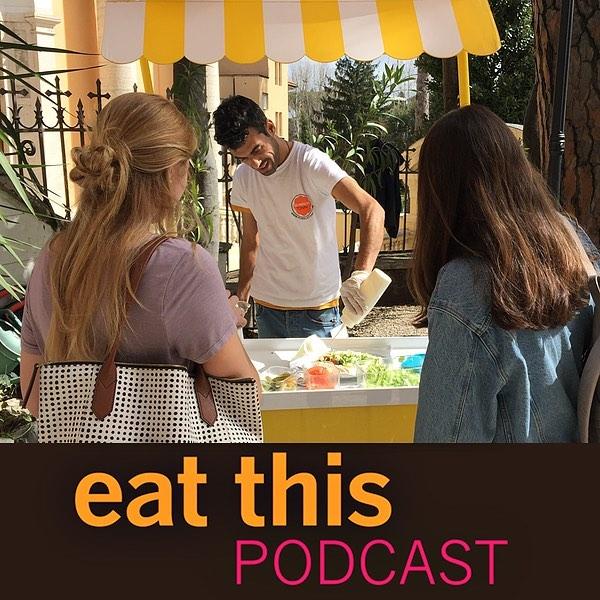I do not believe that consumers are the main beneficiaries of recent trends in the centralisation and industrialisation of food production. Convenient, perhaps, but safe and affordable? At what price?
The big problem with the “all food is processed” and “everything is a chemical” arguments is that they fail to speak the same language as the people for whom “processed” and “chemical” have other meanings. I prefer to ask who benefits from the processing and the chemicals.
Where to push for greater food safety as food supply systems change is such a difficult question, as discussed in my podcast with Shirley Tarawali and Delia Grace @ILRI https://www.eatthispodcast.com/in-praise-of-meat-milk-and-eggs/
TIL that there is such a thing as a non-food interpretation of 🌮
Thanks. That's a very small part of his argument, and we've just had another good chat in which I asked specifically whether the UK could exclude or tax food imports. He said, absolutely. Look at Japan. Food is a strategic issue and outside the WTO. My fear remains that after Brexit there still won't be good food system policies.
Maybe it is because I had already noted a Washington Post piece about "real" food people ignoring the Magnolia cookbook, but I found Grant McCracken's piece about Martha Stewart doing the same so trenchant and also so sad. http://web.archive.org/web/20190514114829/https://medium.com/@grant27/martha-stewart-the-old-guard-d...
2019-04-15
1 min read
'Debatable' List Of '100 Most Jewish' Foods Leaves Plenty Of Room For Kibbitzing in The Salt is an interesting review. Makes me want to read the book. Also makes me want to promote today's episode about one Jewish food and one arguably Christian food. Coming in a couple of hours.
2019-04-12
1 min read
People in NYC probably already know of this astonishing resource but in case you don't, or are just visiting, you should.
https://www.eatingintranslation.com/2019/04/new-york-area-food-events-april-11-18.html
How Big Beer’s Fight Over Corn Syrup Explains American Brewing Today
Interesting piece from Tom Philpott at Mother Jones, pointing out that ALL the big brewers use additional sources of food for their yeasts. Some use corn, some use rice. A pox on all of them.
The research agenda we really need
Colin Tudge at the Campaign for Real Farming points up just a few of the ways in which the current approach to research into food and food production lets us all down.
"Our Hidden Wound | The Contrary Farmer"
On World Food Day, so delighted to see this piece from Gene Logsden pop up in my feed.
https://thecontraryfarmer.wordpress.com/2018/10/15/our-hidden-wound-2/
Cornell's Brian Wansink: A Crisis in Food Science
Not the most important point in the article, but an important point:
Wansink’s sense for harnessing buzz may have been a skill in the wrong domain. He’s a camera-friendly performer who might’ve done very well as a Bill Nye– or Neil deGrasse Tyson–type infotainer, in an industry where simplification to build a compelling narrative is not a bug but a feature, given the explicit mission to deliver an attention-grabbing-and-holding product to an audience.
Had an amazing nine-course tasting menu last night at The Edinburgh Food Studio. Photos would have ruined the experience. From the single radish to begin to the dram of Old Perth 1996 to finish it was a delight for eyes, nose and mouth. Superb all round.
2018-06-11
1 min read
It's all about power. Where the Dublin Gastronomy Symposium leads, the Oxford Symposium on Food and Cooking and the Agricultural History Society follow.
‘Consider flour as flavour’: Bakers turn to whole grains to give their baked goods a boost
“Folks in the 60s and 70s didn’t know how to work with whole grains, and were getting super gritty and dense baked goods,” says Kaufmann. For many in the counterculture, eating these brick-like baked goods was an anti-authority act unto itself. “You were committed to the idealism behind baking whole wheat bread, even if that meant retraining your palate to enjoy it.”
Refusing my mother's wholewheat quiche was the anti-authority act here.
Airlines and Airports – The Brooks Review
This one is really interesting, and had never occurred to me. Not that I have much choice when changing continents.
PROPERLY BREAKING UP A FLIGHT JOURNEY
Simple rule, I’ve learned the hard way: 2 equal length legs of a journey are far better than one long leg and one short one. If the entire world is conspiring against you, and you cannot get a non-stop flight, pick the one with the most equal durations of flying times and try to get a 2 hour layover. That’s enough to pee, stretch, eat, and not stress if your incoming flight is delayed. Also: it’s always better to fly in and out of larger airports as there’s far better food options.
How to discourage enterprise in the English countryside
1 min read
I have only seen one side of but I have no reason to doubt what I've seen there. To me it seems indisputable that, no matter what politicians like Michael Gove may say, there is no real desire to allow small farmers to reform the farming and food landscape in England.
In so many respects, marijuana is a mirror of food, as noted at the mothership https://www.jeremycherfas.net/blog/marijuana-goes-mainstream
A late contender for the best thing about #food I have read all year. Michael Lewis's feature Made in the U.S.D.A. goes inside Trump’s cruel campaign against the U.S.D.A.’s scientists https://www.vanityfair.com/news/2017/11/usda-food-stamps-school-lunch-trump-administration
According to one food writer, "dried chili peppers are grown in the Southwest and dehydrated onion and garlic are grown in California and Oregon" That's some impressive growing, right there.
"Love” is not a common or usual name of an ingredient" I just love how the #FDA took Nashoba Brook Bakery to task. Because, truly, it is important to make sure that labels always tell the whole truth and nothing but the truth, right? https://www.foodpolitics.com/2017/10/fda-says-love-is-not-a-food-ingredient/
At Vespertine, Jonathan Gold makes contact with otherworldly cooking. Is dinner for two worth $1,000?
[T]he sort of dining rooms that tend to do better on the World’s Top 50 Restaurants list than they do in the Michelin guide; the kitchens where the artistic imperatives of the chef tend to outweigh any questions of what a customer might want to eat; the meals after which a cynical diner, confronted with 20-plus courses of kelp, hemp and tree shoots, makes jokes about stopping for tacos on the way home.
Yeah. No.
Probably something to do with food learning
1 min read
it is probably part of the same phenomenon that made my bubba's chicken soup such effective medicine. That is, the exact same food can become very positive or very negative depending on when in the sickness cycle you experience it. Eat a novel food just before you feel ghastly, and you may well be put off it for life. Eat it as you're on the mend -- and the return of appetite is always a good sign -- and you'll probably ascribe magical properties to it, and turn to it whenever you're feelibng a bit better after feeling awful. Constraints on learning and all that.
Why the Price of Food has Nothing to do with the Price of Food – and why science has been corrupted, by Colin Tudge
My old mucker in fine form. To whit:
For in truth, the reasons why so many people in Britain cannot afford food that’s good and fresh has almost nothing to do with the cost of production; and the reasons farmers go bust has almost nothing to do with their supposed “inefficiency”; and the current obsession in high places with robots and GMOs and industrial chemistry is a horrible perversion of science and a huge waste of money which, in the end, is public money. Food is too expensive for more and more people in well-heeled Britain for three main reasons, none of which has anything directly to do with the cost of production, and none of which is alleviated by attempts to make production more “efficient” by sacking people, joining big farms into big estates, or festooning the whole exercize with high-tech. Attempts to mitigate rising prices in the short term by buying more from the world at large will only transfer misery elsewhere, as indigenous agricultures everywhere that evolved to serve the needs of their people are replaced by industrialized monocultures owned by corporates, to provide commodity crops for export.
Not that anyone who needs to is listening.
Nice link @mdesoucey You've seen this, I hope https://foodanthro.com/2017/07/05/cfp-industrial-french-food-and-its-critics/
Making use of food "waste" is a good, but it remains a Band-Aid. http://www.abc.net.au/news/2017-05-30/war-on-waste-funding-boost-for-food-rescue-groups-energy-costs...
The cost of poor food safety practices: $36 million in two years. Which, of course, does not include the commonised costs imposed on the community.
Marion Nestle links to Dole's declarations as it prepares to go public. As ever, though, while the company may have to settle lawsuits and what have you, it does not contribute to the costs borne by those who succumb to food poisonning.
The global trade resource is almost as fascinating as the changing global diets website, with one huge proviso. The arrows go, roughly, from the centre of the exporting country to the centre of the importing country. That is, it completely ignores the reality of containerisation, which has had such a massive impact on food systems and much else besides. There's a new podcast series about it, called Containers, by Alexis Madrigal.
Lookout world food. @ColinKhoury talking about #changingglobaldiets website on the podcast tomorrow.
Interesting conversation with @_amanda_j_lee about food prices and nutrition in Australia http://www.eatthispodcast.com/australia-where-healthier-diets-are-cheaper
I rather like the idea of a "food mirage". The Depressing Truth About Hipster Food Towns | Mother Jones http://www.motherjones.com/politics/2017/04/food-desert-mirage-gentrify-brooklyn-portland-groceries-...
Pork safety in Vietnam: further evidence from @ILRI that eaters and officials worry about the wrong things https://news.ilri.org/2017/03/15/a-deep-dive-inside-vietnams-pork-foodshed-to-determine-food-safety-...
@chrisaldrich Funny you just listened to that. More on "good" industrial food here http://www.eatthispodcast.com/good-industrial-food/
Where’s the romance in milking 300 sheep by hand, twice a day? http://www.eatthispodcast.com/good-industrial-food
Obese vs normal may be more different than poor vs rich in response to food prices http://www.eatthispodcast.com/fat-taxes-and-thin-subsidies/
@kitchenBee on the dangers of demonising whole food groups while fetishing others
It makes me sad to think that so many of us come to see this kind of food paradise as something threatening, full of foods we mustn’t eat and joys to be avoided.
Me too





